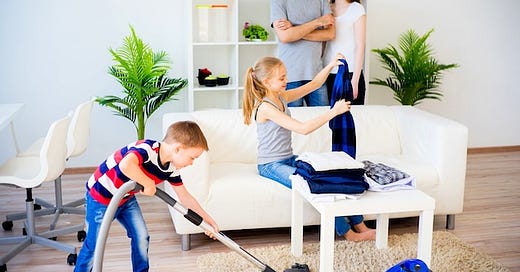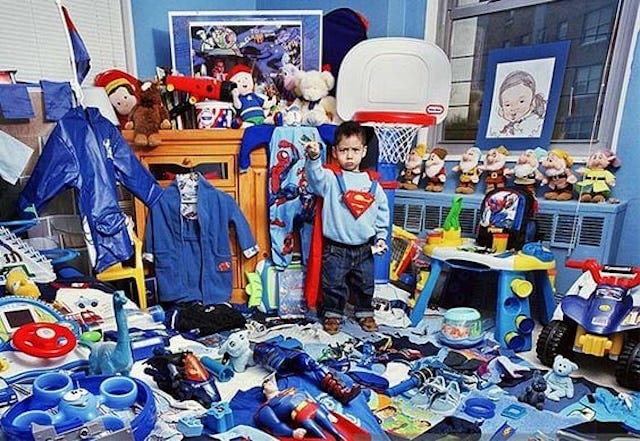Entitlement, rudeness, and your kids.
How to inoculate your kids against the rising tide of incivility
Parenting Matters #100
By: Catherine Lynch and Glenn Collins
Dear Awesome Parent,
Has your kid ever been rude? Have you ever been less than kind, and then regretted it? For us, the answers are yes, and yes. If you answer yes too, you’re not alone. Rudeness, and its close cousin entitlement, are on the rise. And as usual, it’s up to us parents to notice how we may accidentally contribute to it, and come up with practical steps we can take to minimize it in our homes and communities.
We were talking with a friend last week about the rise of rudeness in our culture. Our friend, Anne, is a hair stylist. She used to work full-time at a local salon, but has mostly given it up over the last few years. She still fills in sometimes because she knows the owner, but she hates doing so. The reason she hates it, and the reason she quit in the first place, is the customers. She just doesn’t want to put up with the abuse and poor behavior anymore. It’s not all the customers, of course. In fact it’s not most of them, but she said that when she started out, rude customers were uncommon. But over the last few years things have steadily deteriorated. It’s gotten to the point that she can’t work a shift without at least one customer being rude, nasty, or demeaning.
And it’s not Anne.
We’re not exaggerating when we say she’s one of the nicest, friendliest, and most engaging people we know. She’s cheerful, always has a smile on her face, and is a genuinely good hair dresser who does her best to please her customers. But none of that matters to some people. They feel it’s their right to be rude and nasty.
Anne isn’t alone. Christine Porath, a professor at University of North Carolina’s Kenan-Flagerler Business School, studies incivility. Her latest survey of service workers, conducted in late 2022, found that 76% of respondents experience incivility at least once a month. She’s found a steady increase in rudeness since she began studying it two decades ago. In 2005, a bit less than 50% of those surveyed said they were treated rudely at least once a month. In 2011, it was 55%, and in 2016 it had risen to 62%. And now it’s more than three quarters.
But we don’t really need research numbers to know that bad behavior has been on the rise. It’s become so widespread and well recognized that it’s a meme. Who hasn’t seen a “Karen” (or “Ken”) video of someone behaving badly? Name calling. Cursing. Aggression. Threats. Violence. Throwing things. Hateful speech. Calling the police for frivolous or made up reasons. All of this and more.
You can easily judge the character of a man by how he treats those who can do nothing for him - Johann Wolfgang von Goethe
The question we parents have to grapple with is how do we keep our kids from becoming a part of the problem? How do we help them learn not to be rude, disrespectful, and abusive?
You’re probably thinking “Not my kid. He’s a good kid.” Or “I’m raising her right. She’d never do anything like that.”
You’re probably right.
We hope so.
But kids today are exposed to lots that’s beyond our control. Things that are trying to tilt the balance towards disrespect.
Rudeness in Society: As incivility has increased, our kids see more of it out in world. The more they see, the more “normal” such behavior can seem and the easier it can be for them to engage in it themselves.
Peer Culture: Kids, especially teens, want to fit in with their peers. We all know that being mean to others is a time-honored method some kids use to gain status. Unfortunately, it often works. When our kids see that, they can be tempted to do the same.
Social Media: Rude behavior gets clicks. And the algorithms push it to the top of our kids’ feeds. If it’s popular on social media that means it’s OK. Right?
On-line Interactions: More and more our kids are interacting with others through their screens. It’s much easier to treat someone poorly when they aren’t there in person. They can pick up those behaviors from how they’re treated themselves - and those habits can then translate into real life.
With all of that, anything we can do to help ensure our kids aren’t jerks is a good thing.
Entitlement
One of the biggest factors that contributes to rude behavior is a sense of entitlement, and that has it’s roots deep in our very nature. Humans are social beings, and as such, we’re hierarchical. We naturally compete for status because higher status means better access to resources and mates. But with higher status it’s all to easy for people to believe they’re better than those they see as lower status.
That they’re entitled to what they want.
That the feelings of lower status individuals matter less than their own.
That they can treat people of lower status poorly.
Any conversation about entitlement has to start with ourselves. If you’re reading this article, you’re doing so on a computer, tablet, or smartphone. You probably live in a “first world” country in a house or apartment with reliable electricity, running drinkable water, and climate control.
We’re privileged. Most of our material needs are met. We have comfortable lives - and we want our kids to have comfortable lives too. That’s human nature as well. We do all we can to ensure they have the best chance in life. We give them all the things we think will make their lives better.
And there’s nothing wrong with that! We all want the best for our kids.
But it‘s difficult to raise them in the midst of our abundance and not have them feel entitled. It’s easy for them to take our affluence for granted. That it’s their due.
That they’re better than those who have less.
Or have to do things they don’t.
Or work in jobs they don’t have to.
It’s our job to teach them that privilege has to be balanced with kindness, empathy, and generosity of spirit.
That can be a challenge because it often means making their life a bit more difficult. Making them do things they might not be comfortable with or don’t want to do.
Sorry if this all sounded a bit preachy, but it’s important. A widespread sense of entitlement is a real barrier to the better world we all want. It’s something we must all combat, both in ourselves and our kids.
So what are some practical steps you can take to help your kids not feel entitled or act rudely?
Role Model: This almost goes without saying, but we’ll say it anyway. The way you treat others is the template your kids use to learn how to interact with other people. Be kind, generous, and curious when you interact with service people and encourage your kid to do the same. This breaks down barriers. It helps them see the waitress, the hairdresser, or the person behind the counter as a real person. That they have names, lives, and feelings. They’re not just there to serve us. Try this the next time you’re at a restaurant, checking out at the store, or taking your kid for a haircut. This is how Anne became our friend. Catherine went to the salon for a haircut, connected with Anne, and a friendship was born. A friendship that has enriched our lives.
Help around the house. Someone has to take out the trash, vacuum, cook, wash the dishes, do the laundry, pick up the toys, mow the lawn, and all the other things it takes for a household to run. Who does all that at your house? Get your kid involved as much as is practical. The more they do, the more they learn to value that kind of work. If you hire someone to do some of those things, get to know the people you hire and introduce your kids to them. Help your kids see them as people, not just employees.
Make them responsible for their own room and stuff. Even if you have a housecleaner, make your kid responsible for the upkeep of their own room and stuff. Having to do things that some consider “menial” gives them an appreciation of the work that goes into such tasks. Bonus: Their future spouse will thank you!
A job in a service position. This is obviously for older kids, but there’s nothing like working as a waitress, store clerk, or grass cutter to give them an appreciation for the work that service personnel do. And the crap they sometimes have to put up with from entitled customers.
A Final Note: Sometimes you get bad service. Your hair gets cut too short, or they get your order wrong, or you’re ignored by the salesperson. It happens. In those circumstances we have have the right to be upset. But we also have a choice in how we act. It’s when we’re most stressed and unhappy that it’s most important to choose kindness, grace, and generosity. And help your kids learn it too.
How are you working to make sure your kids aren’t growing up entitled and rude? Let us know in the comments.
Jasmine’s bed
When your cat likes the tiny paper bag better than the soft cat bed. 😂








